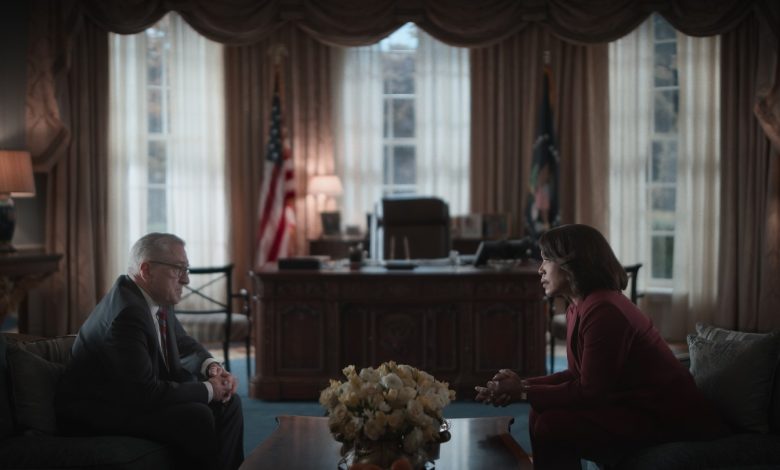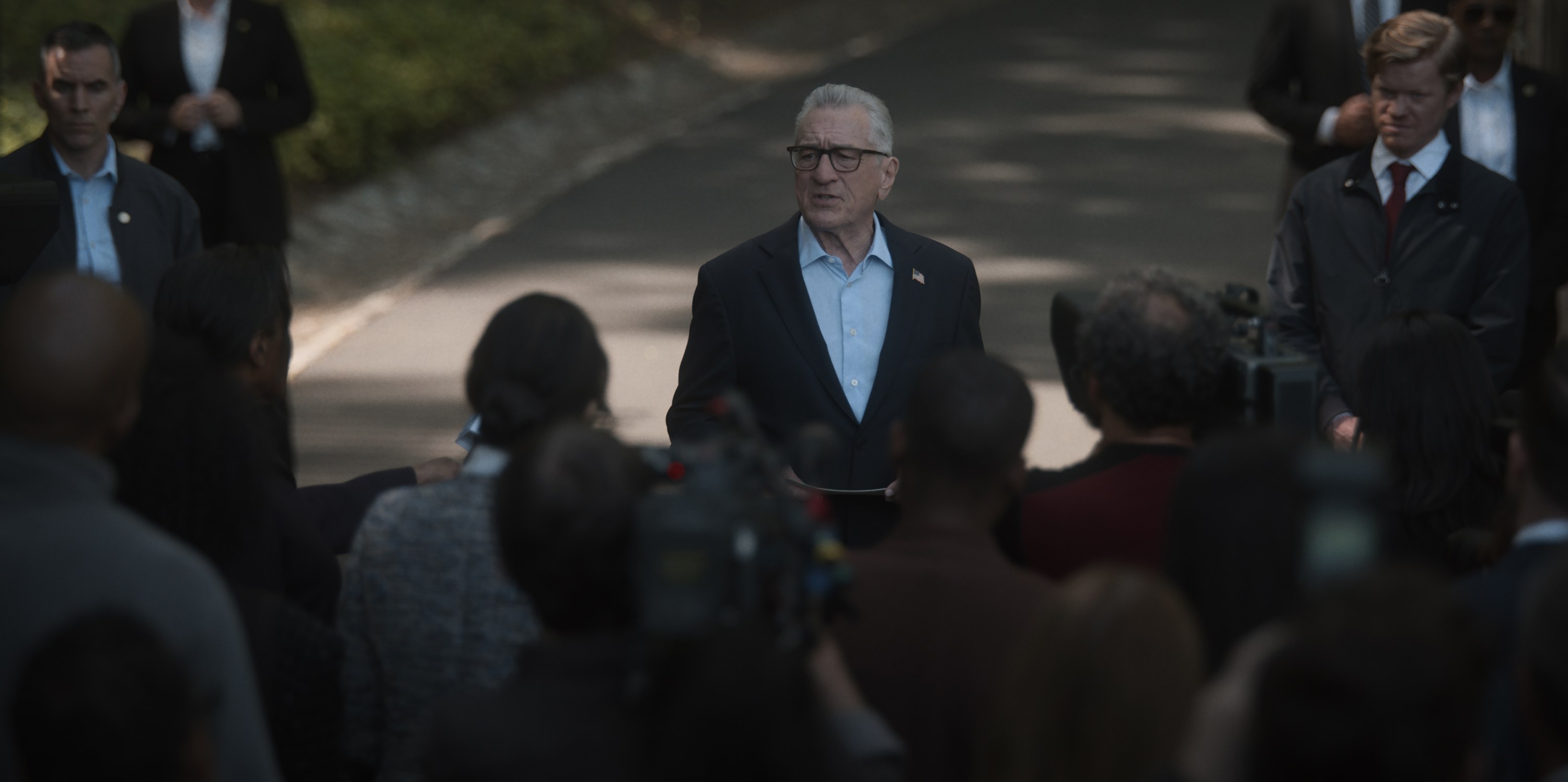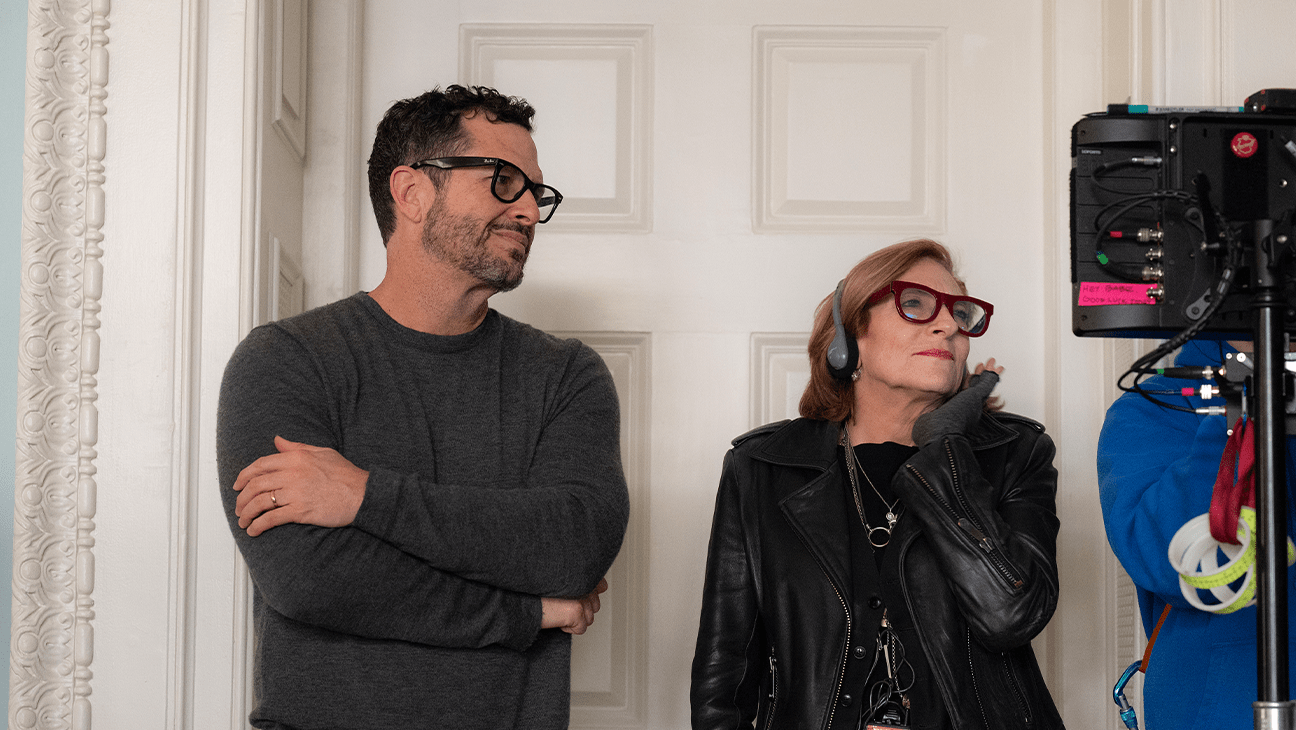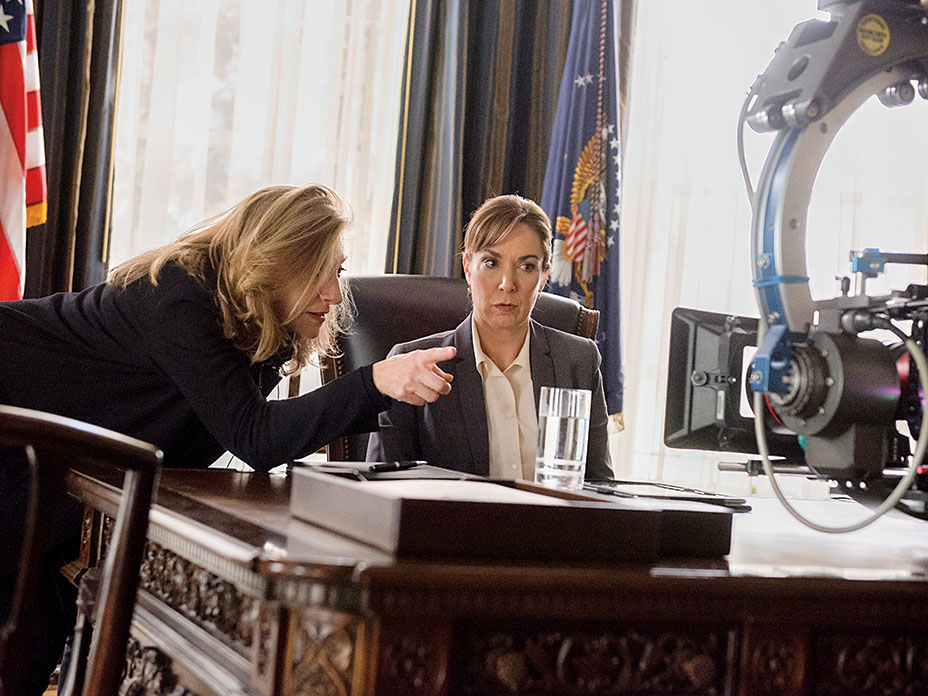Lesli Linka Glatter on ‘Homeland’ to ‘Zero Day’ and Bringing Production Back to Los Angeles

For Lesli Linka Glatter, the seed to her working on Zero Day came 10 years ago, when she was working on Homeland. Glatter, who is now the president of the Directors Guild of America, worked on Showtime’s era-defining espionage drama starring Claire Danes as producer and director, helming 25 episodes throughout its eight-season run.
“I love the political or conspiracy thriller as an engine to tell deep character stories, to look at the world we’re in and juxtapose environment, government and politics with the human being,” Glatter tells The Hollywood Reporter of what drew her to Netflix’s recent hit political thriller starring Robert De Niro. “General Michael Hayden, the former head of the CIA and also of the NSA, who was an adviser on Homeland, had started talking about: what is truth in a post-truth world? What interested me about Zero Day [when I got the script years later] was not taking a political side [to explore that], and there’s a little bit of Homeland in that.”
Glatter came on board to direct all six episodes of Zero Day, created by Eric Newman, Noah Oppenheim and Michael S. Schmidt. The limited series filmed mainly in New York, where De Niro resides, to capture the East Coast political setting for the thriller that follows the first-time TV actor’s former president being called back to service to investigate a catastrophic cyberattack called a zero-day event. Homeland tackled national and global cyberterrorism, including the hacking of elections, but the series never encountered a zero-day attack. “There has never been a zero-day event that affects all industries simultaneously,” says Glatter. “Needless to say, that’s the biggest fear.”
Below, Glatter unpacks the timely themes of Zero Day, reveals a wild Zero Day–Homeland White House connection and looks ahead to her next project at Apple, Imperfect Women. The top TV director-producer, who lost her Pacific Palisades home in the recent wildfires, also takes stock of the industry to urge the return of production to L.A.
***
I was so sorry to see that you lost your home in the fires.
Of course, it was terrible. But it’s so much bigger than me. It’s the whole community. We have to rise from this, and a lot of that I think is trying to keep production in America. I’m starting a new project in March that shoots here in L.A. The kindness of strangers… in the worst of times, people’s better selves come out. I see it all over. The generosity of spirit is really moving. I wish people behaved like that to one another at all times.
That’s actually a lot of what Zero Day speaks to.
It is so true. It’s one of the reasons I wanted to make it.
Zero Day speaks to our current moment. When you first got the pitch, it couldn’t have possibly felt as of the moment as it’s turned out to be. What drew you to the series and made you want to be the sole director?
I was not involved with the development. The script was sent to me and when I read the first hour, what interested me was this idea of how we are relating to truth. And that was happening well before the moment we’re in, which is only more exacerbated now.
The first time I heard [of how truth was evolving] was when I was still on Homeland. One of our advisers, General Michael Hayden, started talking about: what is truth in a post-truth world? This was a while ago, and we are now in a time where we cannot agree on what is fact and what is opinion, even when facts are facts. How do we communicate? We have to find a way to hear each other. If conversations are always filled with accusations and you’re convinced there’s no seed of truth, how do you find a way to reach across?
That’s what interested me about Zero Day. Some of my favorite scenes are when two characters have completely opposing views and there’s a lot of truth in each view, if we could only stop and hear each other.
You never tackled a zero-day event on Homeland that I can recall. Is that right?
That’s right. A zero-day event, which is a flaw in software that can be hacked, is the most powerful cyber weapon known to the intelligence community. There have been many zero-day events since 2010 [when Homeland began production]. We dealt with some cyber intelligence, like the hacking of elections and all of that, and in fact, we used some of the same advisers [as on Zero Day].
Zero Day is realistically real, but where we take reality to another level is the event itself. There has never been a zero-day event that affects all industry simultaneously. Needless to say, that’s the biggest fear,. This took down aviation transportation, banking, power… that has never happened. It’s always been one industry at a time and there has been a patch to fix it. So this was about the idea that you could take down all industries to terrify people. In Zero Day after the attack, everyone gets a message saying: “This will happen again.”
I hate to go back to the horror of 9/11, but it speaks to being attacked and what you do when there is fear and panic. The higher part of oneself and the best thinking does not come out. There is a need to try to find the enemy, the need to feel safe again. You will give up any civil liberty to feel safe again.

You filmed Zero Day at the end of 2023 and through summer 2024, which means the show was done when the November election came and President Trump was reelected.
That’s exactly right. This was written well before the current administration. We cast Angela Bassett [as Zero Day president] having no idea Kamala Harris would end up being the [Democratic presidential] nominee. It wasn’t about that. We made a a point not to talk about the right or left, to try to really deal with the truth of the situation. I’m always interested in what happens when a government or an individual is given unlimited power. Being given unlimited power is a huge burden and most people or governments cannot deal with that and do not make the best choices for the country or humanity.
In the end, the truth wins out when De Niro’s former President George Mullen does the right thing when announcing the results of the Zero Day Commission’s investigation into the attack. It was a surprising ending — both for a political thriller and in political reality. Was that flip ending also part of the intrigue for you?
Yes. This is a show where there’s anxiety everywhere. There’s nothing about our world now or the world of Zero Day where the ground is solid. People do not feel safe, and I wanted to put people in that feeling. I’m always interested in the back rooms of power where decisions are made. One of the things that interested me is that this could end up being a very dark story, and in many ways it is. But there was something about someone making that choice between right and wrong in the end, and where do you stand when confronted with that?
All of the characters have a different relationship with truth. For Mullen, truth is truth. He really stands for that, because having to make a choice that deals with your own personal life or someone in your family would be a very hard choice to make. At the end of the day, you sleep with yourself. What can you live with? I’m amazed at some of the things going on in real life where people can do what they’re doing and feel okay about it, and yet people do. Angela’s President Mitchell at one point says, “Yes, the truth is the truth, but it’s not always the most important thing.” I’m interested in each person’s point of view. How each character sees the world and moves through it.
A lingering question in Zero Day is whether or not Mullen is a reliable narrator or if he’s fit to do this job. As director, you put the audience in his mind and yet we never got a definitive answer. Where do you stand, and what did you want us to think?
I went into that moment by moment. I’m very interested in acuity in our leaders and the idea of an unreliable narrator, but also someone you really want to be able to do it. You’re rooting for him to be able to save us and save America. Skating that line was really interesting: is he all there? Is he the one who is able to do this? Sometimes he is completely there and other times you’re like, is this the person we’ve put our hope and our fates in? And that is also very anxiety producing.
The whole idea of the memory palace is based on research. When these memory sequences came up, he’s trying to remember a conversation he had and is struggling to get back to that moment. When you’re dealing with memory, the very classic exercise to try to remember is to go back to the exact same situation — exact same night, exact same clothes — and empty the room and then fill it back up until hopefully you’re filling back up the piece that you’re desperate to remember. That’s how I tried to conceptualize it. Because I needed to hang on to something that felt real, rather than some tricky visual thing that would make no sense at the end of the day.
But Proteus [the neurological warfare weapon] is a real thing that is based on the Havana syndrome. It’s research done within our own intelligence community on a weapon that is able to alter minds, which is terrifying. So I think there’s some truth to all of it. I think he is suffering from some sort of early dementia, and the stress and pressure all of that, as well as being in the public eye again after 12 years.
Co-creator Eric Newman told me that he wrote it as if there was a weapon being used on Mullen, but then when in post-production on the show, he changed his mind. He said he had to commit when writing it.
That’s how I approached it. That moment by moment, it was happening.

His acuity is certainly very strong in the end, when he announces the findings of his zero-day investigation and exposes how high the corruption goes in U.S. government. What was it like directing De Niro in that finale and recreating the Capitol?
When I first met him, I’m like, “He’s a legend, an icon. He’s Robert De Niro.” But of course, you get to know the human and that falls to the wayside. He is all of those things. But he is also just an amazing guy. He is incredibly committed, smart, works really hard and is a great collaborator. He’s a wonderful No. 1 on the call sheet. We’ve seen him do comedies, but I had no idea how funny he was. This is heavy material and there was a lot of laughter on the set. We all liked each other so that helps; we had an incredible cast and crew. In this team sport, you want to put the absolute best people together. And we were going to be living together for 103 shooting days. That’s a long time.
Where were some highlights of where you filmed?
We were based in New York and, how great to shoot a project that’s actually based in America in America? Given that production is down 40 percent, which is terrible for American storytelling, that is so important. Honestly if De Niro hadn’t said that we need to shoot in New York, I don’t know where we would have shot. Maybe Toronto.
So, we had an amazing time. I love New York. We were based at Steiner Studios [in Brooklyn] and then we shot all over. His estate was in Sleepy Hollow, N.Y. and we shot a lot in the city. It was all based on research because, coming from years of doing Homeland, I want things to feel realistically real. We had amazing advisers.
Where was your White House and Oval office set?
You want to hear something crazy? We had built multiple Oval offices for Homeland and the last one we built had been left in Richmond, Virginia. We carted that set, which had been folded, and we rebuilt it [for Zero Day]. It was repainted and looks completely different. But yes, that was the Oval from Homeland. Someone would make a fortune if they built the perfect West Wing. I even built the West Wing in Morocco [for Homeland].
We also did shoot in DC. Because of 9/11, you can’t shoot anywhere on those Capitol steps. They don’t allow it. It used to be hard, but in West Wing times [which Glatter was a director on], you could shoot all over. But now it’s really different. So we did a green screen. We built steps with columns and everything else around it. But we did shoot all around the White House. We were able to close down streets and use the military, because that needed to feel like it was totally real.
Dan Stevens received a lot of attention for his portrayal of a Tucker Carlson-like media personality. What was it like filming his Evan Green show?
He’s such an extraordinary actor and joy to work with. He just really became that character. We found this amazing house in Oyster Bay, which is the house we shot his scenes in. The shot continued and he went downstairs, so in the basement we built his studio.

I do want to ask how the strikes, the fires and your position at DGA, how all of it is pushing you to call for projects to film in L.A. What is that message from you right now?
I’ve been involved in leadership for a while. When the various people came to me and said, “Will you run for [DGA] president?” I was like, “Absolutely not. I’m way too busy.” But the DGA is built on working leadership. We have amazing people on our board; everyone is working, because you don’t really have skin in the game if you’re not out there in it. I think that helps. I think it makes us strong,.
My dad was a labor organizer at the International Ladies garment Union. From childhood, I understood that you get to a certain place in your career and are supposed to give back to your community. I guess that’s how I ended up doing this. It’s certainly been a hard time, and it’s much more time consuming that I had ever thought, but it’s rewarding in that way. If you can help make a difference, we all need to do that. I’m always inspired by the board and the members in leadership who have these crazy, busy careers who give back to their community.
But I have to say, going from Peak TV to the slumpery slope of the loss of production — from the pandemic when everything shut down to then finally getting back going again, and then having the strikes — all of that has been incredibly hard on production. The DGA is 40 percent UPMs, ADs, second ADs, associate directors, stage managers — were not just directors. We represent the director’s team. So to be 40 percent down in production across America is so horrifying for labor.
I get that the studios and networks are trying to make their shows for a cost. But America, our storytelling industry, the icon of “Hollywood,” we cannot lose that. We cannot lose and not support the labor that has built Hollywood. The studios and networks need to be part of that solution. I understand if you’re doing a show that based in Paris that you’re not going to be shooting in the Midwest. But, let’s try to keep things that are based in America in America. Let’s not go shoot Los Angeles in Australia.
And because of what’s been so damaging with the fires in L.A., we have got to keep production here. We have the best crew in New York, in L.A. and now in Atlanta. We have an amazing production center in Chicago. We have to keep our storytelling business in America.
Can you talk about that next project that you are shooting in L.A.?
I never want to do the same thing twice. I always want to mix it up. I’m doing a project for Apple with amazing actors. I love actors. I’m working with Kerry Washington, Elisabeth Moss and Kate Mara in a show for Apple called Imperfect Women. The whole team is amazing. Annie Weisman is writing. I’m very excited about it. And yes, it shoots in L.A.
***
Zero Day is now streaming on Netflix. Read THR‘s finale postmortems with the co-creators and interviews with the cast.
Source: Hollywoodreporter





